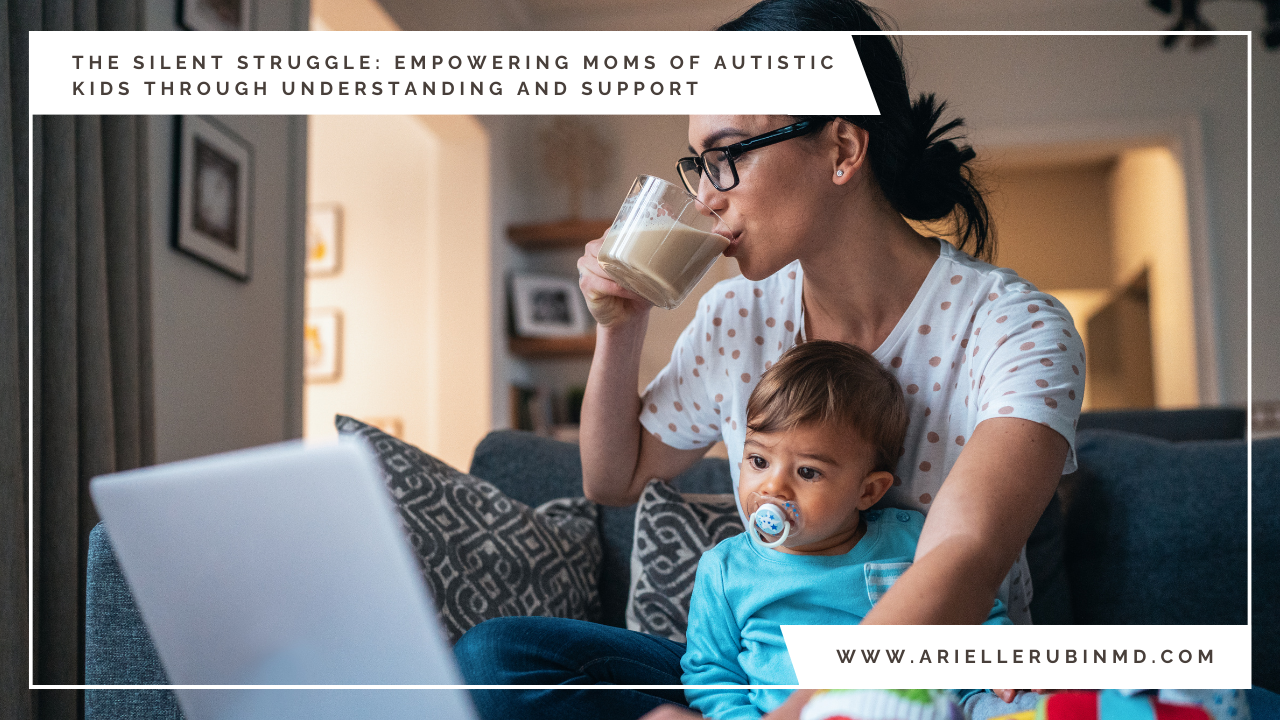The Silent Struggle: Empowering Moms of Autistic Kids Through Understanding and Support
Jul 17, 2023
Motherhood is an extraordinary journey filled with joys and challenges, especially when raising a child on the Autism Spectrum.
Every achievement becomes a monumental victory, and each hurdle may feel like a daunting mountain. Navigating the complexities of this journey requires a profound understanding of the intricate world of autism.
As a child psychiatrist, my role extends beyond understanding a person's autism and its symptoms. It involves recognizing how autism and its challenges can impact family dynamics and parental mental health.
Recent research has shed light on a crucial correlation between:
- Maternal stress
- Mental health
- The severity of autism-related challenges in the family
UC San Francisco, a leading institution in autism research, conducted an extensive 18-month study to explore the complex relationship between child behavior concerns and maternal mental health. The study observed 86 mother-child pairs, half of whom had children diagnosed with autism.
The research employed two reliable measures—the Inventory of Depressive Symptoms for assessing maternal depression and the Child's Challenging Behavior Scale for evaluating child behavior problems. The study revealed a reality faced by many families affected by autism.
Mothers of children with autism reported higher levels of depression and distress than those in the control group.
Importantly, this maternal distress appeared persistent, indicating potential long-term mental health challenges.
Various factors contribute to these findings. Many mothers of individuals with autism experience feelings of guilt and overwhelming responsibility. They also cope with emotional pain and helplessness, witnessing their children face discrimination. Societal narratives and previous theories about the causes of autism often exacerbate these feelings, unfairly placing the blame on mothers for their child's condition. As a psychiatrist, part of my work is urgently challenging and correcting these damaging misconceptions.
Dr. Elissa Epel, a co-author of the study, echoed these sentiments and emphasized the often-overlooked significance of maternal mental health in families dealing with autism.
The results are not without hope, and action can be taken.
These findings underscore the importance of addressing maternal mental health in families of children with autism. Early interventions are crucial. By highlighting the essential role of supportive social policies for mothers, we can enhance access to services for vulnerable families. Improving maternal mental health could pave the way for better outcomes for children and adults with autism. Emphasizing the parent-child relationship in mental health treatment plans could revolutionize intervention strategies.
Given these insights, prioritizing the mental health of mothers with autistic children becomes imperative. These mothers require access to supportive systems and interventions that provide a safe space to express their emotions without judgment. Additionally, equipping them with evidence-based knowledge on how to best care for a child with autism can empower them to handle challenging situations. This simple yet profound approach gives children the best chance to feel acknowledged and validated, significantly influencing their trajectory toward growth and success.
Numerous resources are available to aid mothers in managing stress and bolstering their emotional well-being. Mindfulness classes can equip mothers with tools to cope with stress, promoting a calm and mindful environment conducive to effective parenting. Supportive programs provide a community of shared experiences and understanding, creating a network of empathetic allies. Individual and group therapy can offer a safe space to discuss struggles and learn practical coping strategies. When clinically necessary, medications for maternal mental health are warranted and often lifesaving.
Physicians like me play a pivotal role in supporting mothers in these situations. We must be vigilant for signs of distress, particularly in parents caring for children and adults with autism.
It's crucial to remember that you are not alone. Numerous resources are available from organizations like the National Alliance on Mental Illness (NAMI) and Support for Families of Children with Disabilities. These resources include helplines, support groups, educational programs, and assistance navigating the educational system. Health insurers also offer mental health resources.
In conclusion, there is a pronounced link between child behavior problems and maternal depression in families of children with autism. Acknowledging and addressing this link is critical for alleviating stress and improving maternal mental health, thereby enhancing the family's overall health. Armed with the right resources and a supportive community, moms can better manage their unique challenges, creating a more understanding environment for their children with autism to thrive at any age!
REFERENCE TO THE ORIGINAL STUDY CITED BELOW:
Is it me or my child? The association between maternal depression and children's behavior problems in mothers and their children with or without autism Danielle Roubinov, Brian Don, Robin Blades, Elissa Epel First published: 25 August 2022 https://doi.org/10.1111/famp.12810
Get notified when new blogs are posted and get exclusive insights by joining my weekly newsletter!

